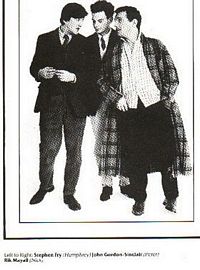THE COMMON PURSUIT by Simon Gray
Venue: Watford 1988
Director: Simon Gray

Cast
| Stuart | John Sessions |
| Marigold | Sarah Berger |
| Martin | Paul Mooney |
| Humphrey | Stephen Fry |
| Nick | Rik Mayall |
| Peter | John Gordon-Sinclair |


Review
Writing as one of the few who enjoyed Simon Gray's The Common Pursuit the first time round at Hammersmith, I cannot deny that it has been immeasurably improved for its West End showing. How and why is difficult to say, except that the author, who now directs the piece himself, is presumably much happier with the casting, which requires young actors to age gracefully, and in one or two cases disgracefully, rather than making mature actors shed 20 years for the all-important opening scene, which establishes the background against which this tragi-comedy of disillusionment and lost ideals sets in.
Simon Gray cleverly shows that we never really change from our students days, though the circumstances under which we live do. Thus Stuart (John Sessions) instigator of the Cambridge literary magazine which gives the play its title, gives himself such high standards of intellectual rigour that they are impossible to fulfil. The womanising Peter (John Gordon Sinclair) is still at it. The lofty homosexual Humphrey (Stephen Fry, looking like a Victorian clergyman) comes to a bad end by giving way to impulses hardly suitable for a senior moral tutor. The outrageously rude Nick (Rik Mayall) achieves his ambition of being a literary personality. Martin (Paul Mooney) has the steady, plodding and unexciting approach necessary for business success. And the liberated Marigold (Sarah Berger) loved in their own ways by all of them but married to Stuart, hardly acquires personal happiness but finds some sort of satisfaction in teaching. But for all their faults, these people are immensely likeable as they bid goodbye to their hopes and dreams while coming to terms with the world as it is. And the performances, all that little bit theatrically heightened, are thoroughly absorbing in a play which gives civilised enjoyment yet at the same time has something important, if occasionally depressing, to say.